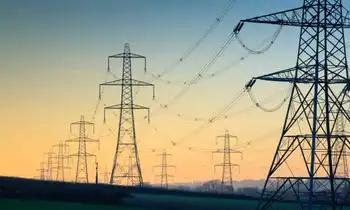LAS VEGAS, NEVADA - Residential customer John Hickman says Nevada Power's "Cool Credits" program is a no-sweat way to save $15 a month in the summer.
Here's how it works: Residents living in single-family homes may volunteer to have radio receivers installed on their air conditioners. The receivers enable Nevada Power to automatically shut off their air conditioners for 10 or 15 minutes every half hour during the hottest hours of the afternoon from June through September. During these hours, Nevada Power pays top dollar for wholesale power because power demand is running high. By shedding some of this power load, the utility reduces its expenses for purchased power. Customers who agree to participate receive a $15 monthly credit toward their summer bills. In effect, these customers are accepting warmer temperatures in exchange for the rebate. But some say that's a small price. "I don't even recognize when (the air conditioner) is on or off," said Hickman, 78, who retired as administrator of the Jerry L. Pettis Memorial VA Medical Center in Loma Linda, Calif. "It's a nice discount. So why not take advantage of it?" His reaction is common. "Typically, most customers don't even notice it, because your air conditioner cycles (on and off) anyway," said Bob Balzar, Nevada Power's director of energy conservation. Nevada Power has been sending notices in monthly bills in an effort to sign up customers in selected neighborhoods because the program is particularly effective when many customers in the same neighborhood participate. That results in noticeably less stress on a neighborhood electric distribution equipment, Balzar explained. The program is open to all single-family residential customers. Nevada Power intends to sign up 6,000 new Cool Credits customers for the year. Nevada Power has installed 2,000 new radio control devices this year and has a backlog of 1,000 customers waiting for installations. Nevada Power already has 11,000 customers participating in the program and wants to bring the total to 17,000, he said. He estimated that Nevada Power will cut its peak demand by 20 megawatts -- enough to supply power to 14,000 homes. "That's starting to be big enough where we can see some reduction in our summer purchases and that benefits all customers," Balzar said. The program costs Nevada Power $3 million in rebates and installation costs, but state regulators allow the utility to recover those funds through rates. A similar program was started in the late 1980s, but Nevada Power discontinued the program in the 1990s when Nevada was planning to deregulate its electric power industry and allow competitors to vie for retail customers. Nevada reversed course after it saw power prices soar during the Western power crisis. The air conditioner rebate program was reinstated in 2001.
Residents living in single-family homes may volunteer to have radio receivers installed on their air conditioners. The receivers enable Nevada Power to automatically shut off their air conditioners for 10 or 15 minutes every half hour during the hottest hours of the afternoon from June through September.
During these hours, Nevada Power pays top dollar for wholesale power because power demand is running high. By shedding some of this power load, the utility reduces its expenses for purchased power.
Customers who agree to participate receive a $15 monthly credit toward their summer bills. In effect, these customers are accepting warmer temperatures in exchange for the rebate.
But some say that's a small price.
"I don't even recognize when (the air conditioner) is on or off," said Hickman, 78, who retired as administrator of the Jerry L. Pettis Memorial VA Medical Center in Loma Linda, Calif. "It's a nice discount. So why not take advantage of it?"
His reaction is common.
"Typically, most customers don't even notice it, because your air conditioner cycles (on and off) anyway," said Bob Balzar, Nevada Power's director of energy conservation.
Nevada Power has been sending notices in monthly bills in an effort to sign up customers in selected neighborhoods because the program is particularly effective when many customers in the same neighborhood participate. That results in noticeably less stress on a neighborhood electric distribution equipment, Balzar explained.
The program is open to all single-family residential customers. Nevada Power intends to sign up 6,000 new Cool Credits customers for the year. Nevada Power has installed 2,000 new radio control devices this year and has a backlog of 1,000 customers waiting for installations.
Nevada Power already has 11,000 customers participating in the program and wants to bring the total to 17,000, he said. He estimated that Nevada Power will cut its peak demand by 20 megawatts -- enough to supply power to 14,000 homes.
"That's starting to be big enough where we can see some reduction in our summer purchases and that benefits all customers," Balzar said. The program costs Nevada Power $3 million in rebates and installation costs, but state regulators allow the utility to recover those funds through rates.
A similar program was started in the late 1980s, but Nevada Power discontinued the program in the 1990s when Nevada was planning to deregulate its electric power industry and allow competitors to vie for retail customers.
Nevada reversed course after it saw power prices soar during the Western power crisis.
The air conditioner rebate program was reinstated in 2001.
Related News

B.C. politicians must focus more on phasing out fossil fuels, report says
VANCOUVER - Politicians in British Columbia aren't focused enough on phasing out fossil fuel industries, a new report says.
The report, authored by the left-leaning Canadian Centre for Policy Alternatives, says the province must move away from fossil fuel industries by mid-century in order to meet its climate targets, but adds that the B.C. government is ill prepared to transition to a green economy.
"We are totally moving in the wrong direction," said economist Marc Lee, one of the authors of the report, on The Early Edition Wednesday.
He said most of the emphasis of B.C. government policy has been on slowing reductions…




